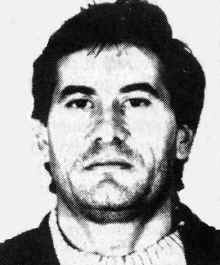Casalesi clan
Casalesi clan is a powerful faction within the Camorra, a traditional criminal organization based in the Naples region of Italy. The clan takes its name from Casal di Principe, a town in the province of Caserta, which has long been considered the stronghold of this group. The Casalesi clan has been involved in a wide range of criminal activities, including drug trafficking, money laundering, extortion, and murder, establishing itself as one of the most powerful and feared criminal organizations not only in Italy but also internationally.
History[edit | edit source]
The origins of the Casalesi clan trace back to the 1970s, when it began to establish its power base in the Campania region. Over the decades, the clan has been led by several notorious bosses, with Antonio Bardellino being one of the founders and the first leader of the clan. After Bardellino's disappearance in the late 1980s, leadership passed to Francesco Schiavone, also known as Sandokan, and Mario Iovine. The clan's influence expanded significantly under their leadership, extending its operations across Europe and even to South America, particularly in the cocaine trade.
Criminal Activities[edit | edit source]
The Casalesi clan's criminal activities are diverse, including involvement in the construction industry, where they have been known to use their muscle to secure contracts and engage in widespread corruption to ensure profitability and control over the sector. The clan is also heavily involved in the illegal disposal of toxic waste, a lucrative but environmentally destructive activity that has raised significant public health concerns in the affected areas.
Drug trafficking remains a cornerstone of the clan's operations, with the Casalesi managing extensive networks for the distribution of cocaine, heroin, and other illegal substances. Their control over drug trafficking routes has enabled them to amass significant wealth, which is laundered through legitimate businesses, including real estate, hospitality, and agriculture.
Legal Battles and Arrests[edit | edit source]
The Italian government and international law enforcement agencies have made significant efforts to dismantle the Casalesi clan's operations. Notable successes include the arrest of Francesco Schiavone in 1998 and the capture of other key members in subsequent years. The trial known as the "Spartacus Trial" was a landmark in the fight against the Camorra, leading to the conviction of dozens of Casalesi members for a range of crimes, including murder, drug trafficking, and extortion.
Despite these efforts, the Casalesi clan remains a potent force within the Camorra, with new leaders emerging to continue the clan's criminal enterprises. The Italian state continues to face significant challenges in eradicating the influence of the Casalesi and other Camorra clans from the region.
Impact on Society[edit | edit source]
The activities of the Casalesi clan have had a profound impact on the regions in which they operate, fostering a climate of fear and contributing to the economic and environmental degradation of the area. The illegal disposal of toxic waste has been particularly damaging, leading to widespread health issues among the local population and long-term environmental damage.
The clan's involvement in the construction industry and other sectors of the economy also undermines legitimate businesses, which cannot compete with the clan-backed enterprises. This stifles economic growth and development in the region, perpetuating a cycle of poverty and dependence on the illicit economy.
In Popular Culture[edit | edit source]
The Casalesi clan has been the subject of numerous books, films, and television series, reflecting the public's fascination with organized crime. These portrayals often highlight the brutal nature of the clan's activities but also the complex social and economic factors that fuel the Camorra's continued existence.
Search WikiMD
Ad.Tired of being Overweight? Try W8MD's physician weight loss program.
Semaglutide (Ozempic / Wegovy and Tirzepatide (Mounjaro / Zepbound) available.
Advertise on WikiMD
|
WikiMD's Wellness Encyclopedia |
| Let Food Be Thy Medicine Medicine Thy Food - Hippocrates |
Translate this page: - East Asian
中文,
日本,
한국어,
South Asian
हिन्दी,
தமிழ்,
తెలుగు,
Urdu,
ಕನ್ನಡ,
Southeast Asian
Indonesian,
Vietnamese,
Thai,
မြန်မာဘာသာ,
বাংলা
European
español,
Deutsch,
français,
Greek,
português do Brasil,
polski,
română,
русский,
Nederlands,
norsk,
svenska,
suomi,
Italian
Middle Eastern & African
عربى,
Turkish,
Persian,
Hebrew,
Afrikaans,
isiZulu,
Kiswahili,
Other
Bulgarian,
Hungarian,
Czech,
Swedish,
മലയാളം,
मराठी,
ਪੰਜਾਬੀ,
ગુજરાતી,
Portuguese,
Ukrainian
Medical Disclaimer: WikiMD is not a substitute for professional medical advice. The information on WikiMD is provided as an information resource only, may be incorrect, outdated or misleading, and is not to be used or relied on for any diagnostic or treatment purposes. Please consult your health care provider before making any healthcare decisions or for guidance about a specific medical condition. WikiMD expressly disclaims responsibility, and shall have no liability, for any damages, loss, injury, or liability whatsoever suffered as a result of your reliance on the information contained in this site. By visiting this site you agree to the foregoing terms and conditions, which may from time to time be changed or supplemented by WikiMD. If you do not agree to the foregoing terms and conditions, you should not enter or use this site. See full disclaimer.
Credits:Most images are courtesy of Wikimedia commons, and templates Wikipedia, licensed under CC BY SA or similar.
Contributors: Prab R. Tumpati, MD

